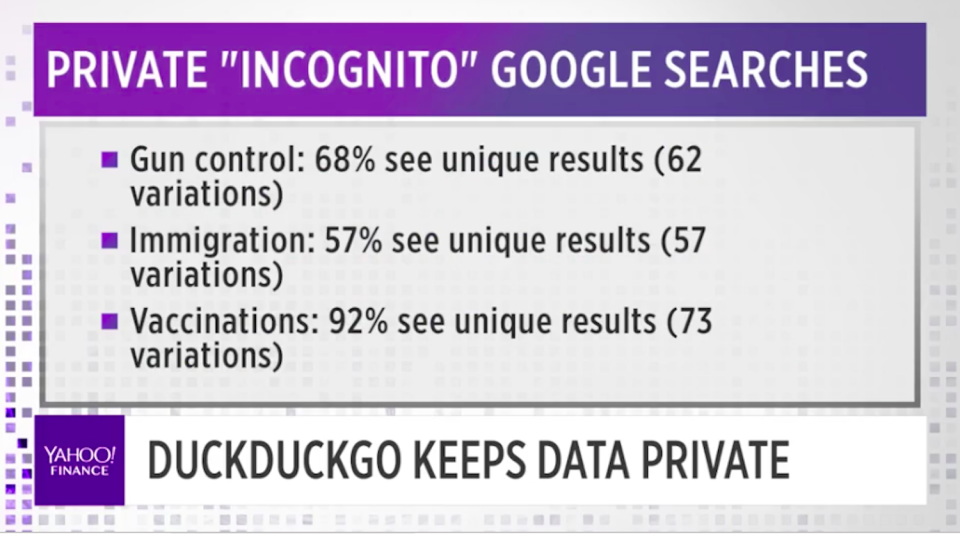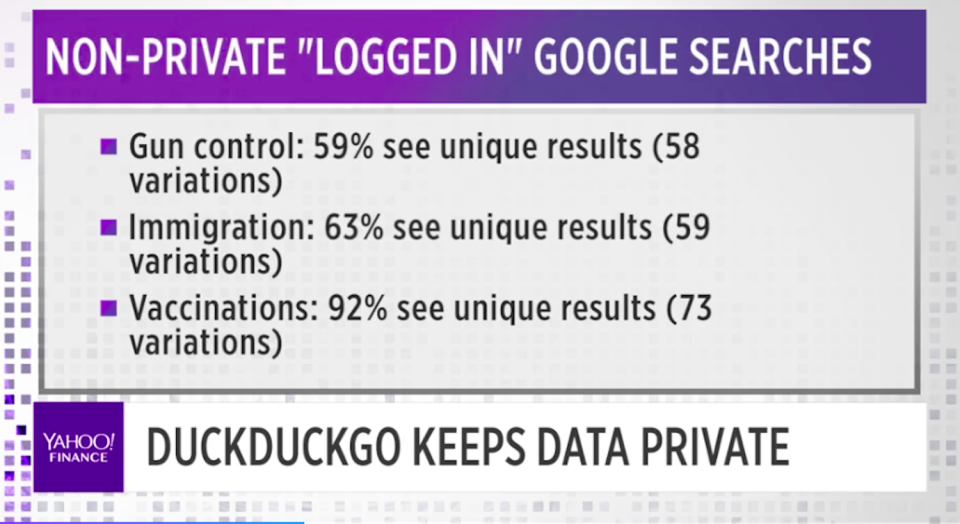Google's search leaves users in the dark: DuckDuckGo CEO
If you use Google’s search engine, “There’s no way of knowing what you’re missing,” says Gabriel Weinberg, CEO and founder of search engine DuckDuckGo, whose company released a study Tuesday claiming that Google is manipulating Americans’ search results.
The study concludes that Google is editorializing and providing different search results for different users who search for identical terms, within seconds and minutes of each other.
“The editorialized results are informed by the personal information Google has on you, like your search, browsing and purchase history,” the study says.
“What we’re seeing is intense amounts of variation,” Weinberg told Yahoo Finance. “Most of the people in the study saw results completely unique to them.”
By unique, Weinberg means that inconsistent source links appeared in search results, and some of the same links appeared in varying hierarchical order.
Seventy-two U.S. participants in the study entered three independent Google search terms — gun control, immigration, and vaccinations — using a desktop Chrome browser at 9 p.m. eastern time on July 24, 2018.
Unique results were returned for 68% of private searches for “gun control,” 57% of searches for “immigration,” and 92% of searches for “vaccinations.”
According to the study, Google returned these filtered results, regardless of whether participants searched in private “incognito,” or non-private mode.
“It’s exactly opposite of what people would expect,” Weinberg said.

In non-private mode, unique search results were generated for 59% of searches for “gun control,” 63% of searches for “immigration,” and 92% of searches for “vaccinations.”

“Our proposition is that if you search in the U.S. you should be seeing the same things, especially when you search major political topics,” Weinberg said.
‘Search personalization doesn’t actually help search results’
DuckDuckGo decided to run the new study after a previous version examined Google search results in connection with the 2012 presidential campaigns. A Wall Street Journal study, commissioned around the same time, mirrored DuckDuckGo’s findings, showing that Google’s personalized search results inserted tens of millions of more links for then-candidate Barack Obama than for his primary challenger Mitt Romney.
“Search personalization doesn’t actually help search results, it really hurts in the aggregate, making people more politically polarized,” Weinberg said.
In his experience, Weinberg says when consumers think of search personalization they’re really expecting search localization for services like local weather, local restaurants, and maps, rather than national or international political issues.
“You can do that all without a filter bubble because it’s not based on your search history,” he said, adding that search-based ad revenue is not dependent on search personalization.
DuckDuckGo’s study controlled for local results by designating all local search results as equal and accounting for no variation if the local links appeared in the same hierarchical order. A result showing an LA Times link, for example, was treated the same as link to the Chicago Tribune.
For critics who dispense with the importance of result order, Weinberg says they’re mistaken.
“The first link gets about 40% of the clicks, the second gets about 20%, and it drops off by half with each [subsequent] link,” he said. “If you switch the second and first link, that’s actually a huge difference” because the one is now getting twice as many clicks as the other.
Yahoo Finance reached out to Google for a response to DuckDuckGo’s study and didn’t receive a response.
“I’m really not on any particular side,” Weinberg said when asked about his political ideology.
‘A completely black box’
He says he’d like to see Congress question Google CEO Sundar Pichai about search result bias when he testifies before the House Judiciary Committee on December 11.
“We understand [the study] is coming from a competitor and there’s an inclination to believe [the findings] less so. That’s why we made it all public, the data, the code, the directions, and we are basically saying we believe other people should study this,” he said.
Weinberg says editorialized results may be crafted depending on the level of privacy, and the number of Android products you use.
“They may have all your email, they may have all your text messages, have all your photos, all your contacts, so [editorialized content] can be based on all of those things. It’s a completely black box and opaque to consumers.”
A few people in the study were given a much broader range in search results from what the majority of participants were seeing, Weinberg said.
“You would just have no idea if you were one of those people. And you also would have no idea, even if you know you’re seeing something different, why you’re seeing it.”
Alexis Keenan is a New York-based reporter for Yahoo Finance. She previously produced live news for CNN and is a former litigation attorney. Follow her on Twitter at @alexiskweed
Follow Yahoo Finance on Twitter, Facebook, Instagram, Flipboard, LinkedIn, and reddit.
Read more:
Apple faces massive legal risk, and it’s not about iPhone demand or tariffs
Weed is legal in 3 more states — here’s what to expect from the new laws
Why Philadelphia halted plans to unleash e-scooters across the city
Here’s how eBay alleges Amazon illegally lured its ‘high-value’ sellers
Winning the Mega Millions is sweeter in some states than others
